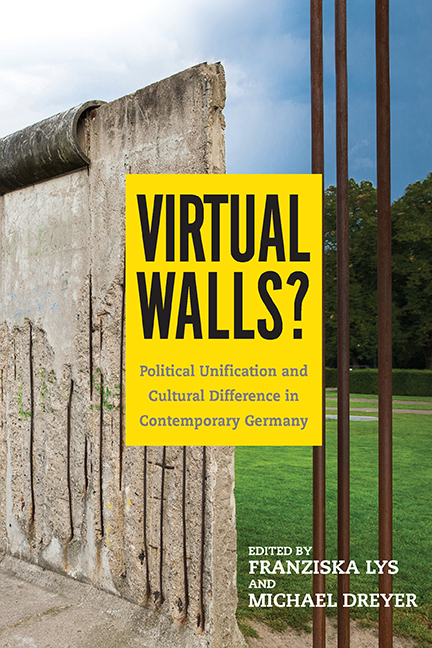Book contents
- Frontmatter
- Dedication
- Contents
- Acknowledgments
- Introduction: United Politics—Divided Culture?
- Part I What Remains: History and the Constitution
- Part II What and How Do We Remember? Literature, Film, and Exhibitions
- 3 East German Literature and Reunification: Continuities and Discontinuities
- 4 The Afterlife of the GDR in Post-Wall German Cinema
- 5 Exhibiting 1989/2009: Memory, Affect, and the Politics of History
- Part III A Changing Reception: Painting, Orchestras, and Theaters
- Part IV A Virtual Wall? Education and Society
- Epilogue: The Wende and the End of “the German Problem”
- Notes on the Contributors
- Index
4 - The Afterlife of the GDR in Post-Wall German Cinema
from Part II - What and How Do We Remember? Literature, Film, and Exhibitions
Published online by Cambridge University Press: 24 August 2019
- Frontmatter
- Dedication
- Contents
- Acknowledgments
- Introduction: United Politics—Divided Culture?
- Part I What Remains: History and the Constitution
- Part II What and How Do We Remember? Literature, Film, and Exhibitions
- 3 East German Literature and Reunification: Continuities and Discontinuities
- 4 The Afterlife of the GDR in Post-Wall German Cinema
- 5 Exhibiting 1989/2009: Memory, Affect, and the Politics of History
- Part III A Changing Reception: Painting, Orchestras, and Theaters
- Part IV A Virtual Wall? Education and Society
- Epilogue: The Wende and the End of “the German Problem”
- Notes on the Contributors
- Index
Summary
DESPITE THE COLLAPSE of the SED regime and unification, the German Democratic Republic continues to live on in the social imaginary, especially in contemporary German cinema. Since 1989 a plethora of feature films set in the GDR have graced the silver screen, and while they employ different perspectives, conventions, and aesthetic approaches, they share a fundamental interest in the past that coalesces them into a genre. Genre is notoriously difficult to characterize definitively. Predictable storylines, recurring characters, and familiar visual cues form a distinct connection between texts, but “genres do not consist only of films, they consist also, and equally, of specific systems of expectation and hypothesis which spectators bring with them to the cinema, and which interact with films themselves during the course of the viewing process” (Neale 2000, 46). Genre encompasses more than a set of texts with shared formal characteristics and themes. It is also a discursive network, in which the expectations of multiple and often competing stakeholders (filmmakers, viewers, and critics) are presented, interpreted, negotiated, and contested. Genre is distinguished by a continuous process of transformation, which entails a messy course of articulation, disruption, and renewal rather than a smooth evolution. Rick Altman (1999, 195) has suggested that “genres are regulatory schemes facilitating the integration of diverse factions into a single unified social fabric. As such, genres operate like nations and other complex communities. Perhaps genres can even teach us about nations.” The history-film genre can be seen as a bellwether of how the German nation seeks to integrate competing discourses on the GDR past into a single unified social fabric.
Over the last few decades the history film has gained increasing credence as a valid source of historical knowledge. Robert Rosenstone (1992, 1138) offers a broad definition of the history-film genre by suggesting that its primary salient feature “is its willingness to engage the discourse of history—that is, the facts, the issues, and the arguments raised in other historical works.” Like many historians and cultural critics, however, Rosenstone (1995, 11–12) presents a twofold classification that segregates what he calls standard or mainstream history films from the serious inquiry found in postmodern history films.
- Type
- Chapter
- Information
- Virtual Walls?Political Unification and Cultural Difference in Contemporary Germany, pp. 72 - 95Publisher: Boydell & BrewerPrint publication year: 2017



